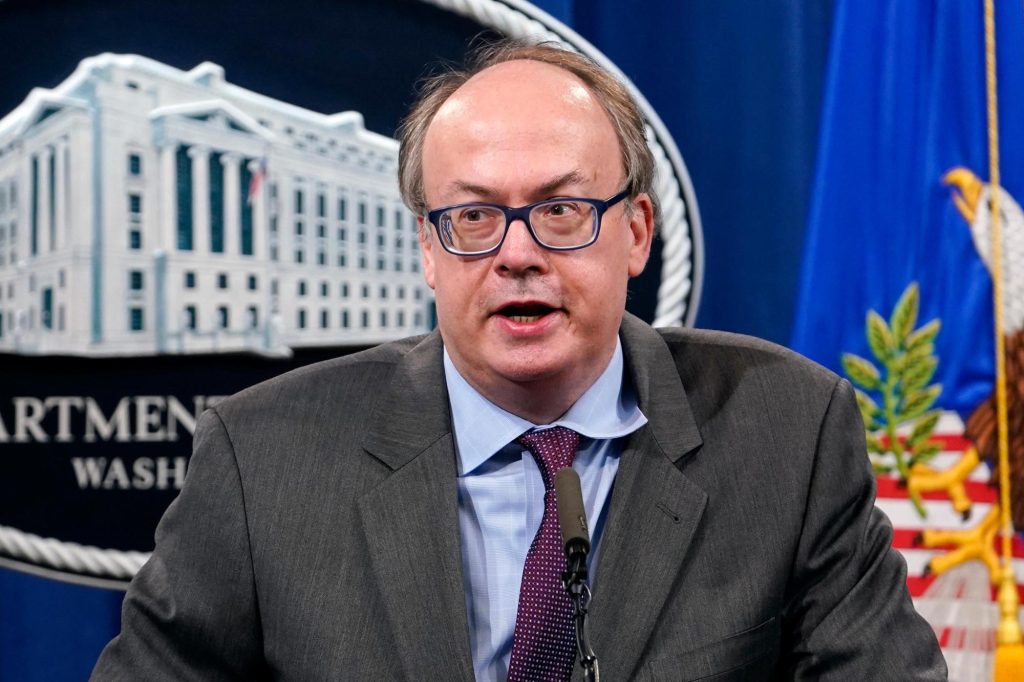By GARY FIELDS (Associated Press)
WASHINGTON (AP) — The second day of the disciplinary hearing for former Justice Department official Jeffrey Clark presented a picture of someone who, despite numerous attempts by his superiors to convince him otherwise, remained steadfast in his belief that there were irregularities and fraud in the 2020 election that warranted further investigation.
On Wednesday, former acting Attorney General Jeffrey Rosen testified before the three-member Board of Responsibility, stating that he and Richard Donoghue, who had been the acting No. 2, met with Clark multiple times after the 2020 presidential election to encourage him to reconsider his position on how the department should handle allegations of voter fraud.
Clark is accused of trying to engage in deceptive conduct following then-President Donald Trump’s loss in the 2020 presidential election and his efforts to overturn the election. The focus is on a letter drafted by Clark which stated that the department was looking into “various irregularities” and had identified “significant concerns” that may have affected the election. He wanted Rosen and Donoghue to send the letter to Georgia.
During one of the meetings, they questioned why he was pursuing an issue that was beyond his responsibility as the acting head of the department’s civil division.
Rosen stated, “Mr. Clark wasn’t very forthcoming. He just indicated these were his ideas. He thought they were good ones.”
They tried to explain why the department had determined that while there was fraud and misconduct, it was not sufficient to have altered the election outcome. Additionally, they discovered that Clark had spoken with Trump, a violation of department policy regarding contact with the White House.
Rosen mentioned that the meeting concluded with Clark saying, “Well, I thought these were good ideas, but if you don’t like them, then OK.” Rosen and Donoghue believed that Clark had accepted their explanation and that the matter was settled.
However, this was not the case. Clark persisted with his efforts and continued to keep in touch with Trump.
Rosen changed his approach and at one point Clark received a confidential briefing from the Office of the Director of National Intelligence concerning an allegation he had heard. Rosen and Donoghue opted to grant him access and also suggested that he speak with a U.S. Attorney in Georgia about how he had pursued allegations there.
“He had shown interest in the ODNI report, so I thought that was a way to both prevent him from giving poor advice to the president and possibly understand why the rest of the department had the position we had,” Rosen revealed during his testimony.
Clark remained steadfast in his stance, disagreeing with the report, and did not reach out to the U.S. Attorney.
The situation escalated when Trump contemplated firing Rosen and installing Clark in his place. This was avoided when the senior leaders at the Justice Department and White House lawyers stated they would resign if Trump took that action.
Rosen’s testimony occupied the majority of the day. Clark was summoned to testify by Hamilton Fox III, the disciplinary counsel at the hearing, despite objections from Clark’s attorneys, who indicated that their client had made it clear he would invoke privilege.
Clark responded to the initial queries about when he joined the Washington, D.C., bar and about his work history up until his time at the Justice Department.
He cited several rights, including executive privilege, law-enforcement privilege, deliberative-process privilege, attorney-client privilege, and the Fifth Amendment, which safeguards people from giving self-incriminating testimony, during more than 30 minutes of questioning from Fox, focusing on the letter and Clark’s role in the aftermath of the election.
At one point, following Fox’s questioning, board member Patricia Mathews asked who Clark’s client was for his assertion of attorney-client privilege and Clark replied: “President Trump. The head of the executive branch. The sole and the unitary head of Article Two, the executive branch of the United States government.”
One of his lawyers intervened and requested that Clark continue asserting the rights he used during the remainder of the questioning.
Clark is confronting criminal charges in Georgia for his role in the attempt to overturn the election there. Trump is one of the co-defendants.
Clark could face penalties, including potential disbarment. He can challenge any action taken against him to the D.C. Court of Appeals.
His attorney, Harry MacDougald, has stated that the action being taken against his client for engaging in the normal back and forth between lawyers would have a chilling effect on the profession.
The case resumes Thursday with defense witnesses.









